GRI Authority Locks in Stable Rates for Electricity and Gas Next Year; Carter Steps Down

BY JENNIFER CABRERA
GAINESVILLE, Fla. – At their meeting on May 14, the GRU Authority adopted a budget with no increase in electric or gas rates, and Director Craig Carter announced his resignation.
Fitch affirms GRU’s bond ratings, praises Authority
During Chair Comments, Chair Eric Lawson congratulated the GRU administration on Fitch’s recent
affirmation of GRU’s bond ratings
The statement issued by Fitch noted that the rating “is not affected by the utility’s connection to or the financial strength of the city of Gainesville.”
According to Fitch’s comments, “The robust revenue defensibility of the integrated utility system is bolstered by its dominant market position as a crucial service provider within a region characterized by positive demand trends. This advantage is further strengthened by the entity’s independent authority over pricing structures along with competitively low charges for consumers… By fiscal year 2024, [GRU’s] financial leverage had decreased to 8.8 times due to a substantial decrease in transfers from the utility’s general funds, expedited repayment of debts, and reduced obligations related to pensions… Additionally, the board has demonstrated effective governance since being established on May 16, 2024.”
CEO Ed Bielarski stated, “Their strategy relies on the financial plan we’ve discussed.”
Water fluoridation
In the open forum for public comments, Angela Casteel questioned when the utility would adhere to SB700, legislation that bans fluoride from water systems in Florida. Although her inquiry came before the bill was signed into law — it happened later today and goes into effect on July 1st.
Director David Haslam stated that they would cease adding fluoride either by June 30 or whenever their supply runs out. Similarly, Director Chip Skinner added, “We won’t buy additional chemicals for the water treatment. Therefore, if we deplete our stock earlier than planned, it will end sooner; otherwise, this change will come into effect from July 1.”
Security deposits
In his remarks as CEO, Bielarski discussed the extra security deposits imposed on customers who lag in their payments. He stated this practice is “standard procedure” since falling behind raises the “risk for other clients,” thus necessitating measures to offset potential losses. Bielarski noted methods exist to reduce these security deposits and emphasized they are open to discussions with affected individuals. Customers can opt to pay these additional charges over time; however, GRU doesn’t initially present this option because “it encourages dialogue.” They prefer direct interaction where representatives listen and converse individually with each customer to understand specific circumstances better. According to him, personal engagement plays a crucial role in addressing such issues effectively.
Financial update
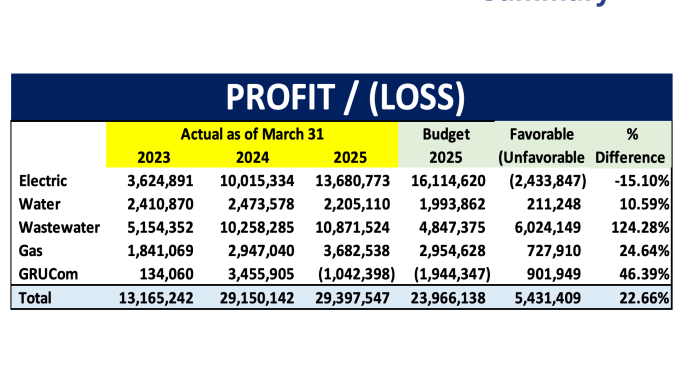
In a financial briefing, Bielarski stated that the company’s profits have nearly doubled, thanks to effective expense management and savings from a decreased transfer to the General Fund.
Budget presentation
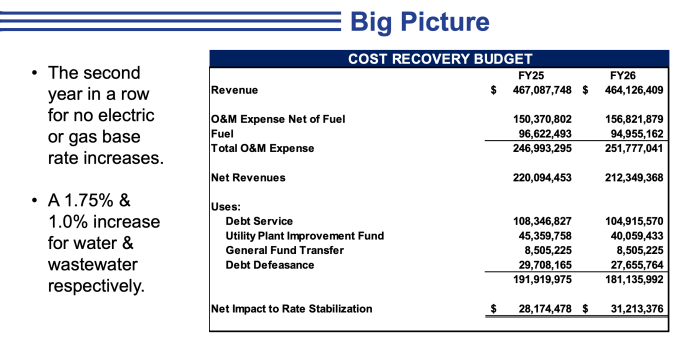
In a budget presentation, Bielarski stated that his proposed budget does not entail any hikes in electricity or natural gas prices for yet another consecutive year. However, water rates are set to rise by 1.75%, and wastewater fees will go up by 1%. Prior to the transfer of the utility’s oversight to the Authority, the City Commission had been adhering to a resolution from 2021 concerning this matter.
raise electricity rates by 3 percent annually
through 2027.
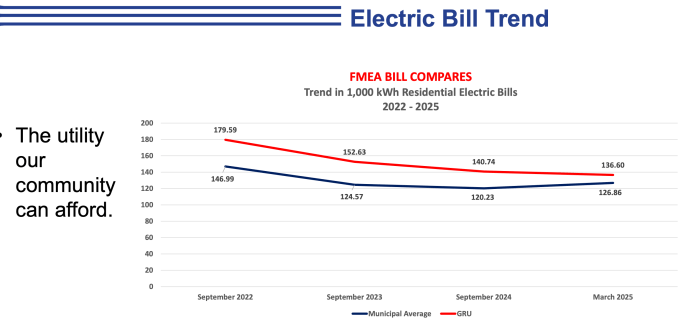
In the provided chart above, Bielarski highlighted the difference between GRU’s 1,000 kWh residential electricity cost and the mean rate charged by public utility providers across Florida. This disparity shrank from $32.60 monthly in September 2022 to just $9.74 each month by March 2025. Between October 1, 2022, and March 2025, GRU rates decreased by 24%, whereas the typical decline experienced by other municipal utilities within Florida was only around 14%.
Bielarski stated, “When rating agencies such as Fitch examine our performance and review the financial plans, they recognize that ‘[GRU is] backing up their statements with actions. They genuinely prioritize their customers. Their focus is on addressing customer concerns related to bills.'”
He mentioned that he has recently conversed with the CEOs of the leading five municipal utility companies in Florida, noting, “‘They’re considering rate hikes, but we aren’t.'”
Lawson indicated that fixed rates won’t persist indefinitely; he anticipates the company will “return to a standard operational framework” and apply certain price hikes once they reach their desired position “from a competitiveness viewpoint.”
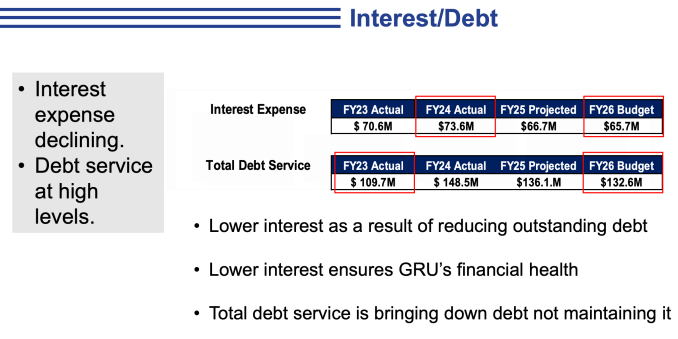
Bielarski noted that the interest expenses for FY26 would decrease by approximately $8 million compared to those in FY24, freeing up funds that could be utilized to reduce debt. According to him, GRU managed to retire $110 million worth of debt service in FY23 and anticipates paying off $132.6 million in FY26. The green segments within the graph indicate additional reductions beyond what was planned. Bielarski further emphasized that decreasing the debt will “prove advantageous for the city over time.” His aim is for them to maintain an involved and proactive community with strong finances. They do not intend this approach to be overly harsh.
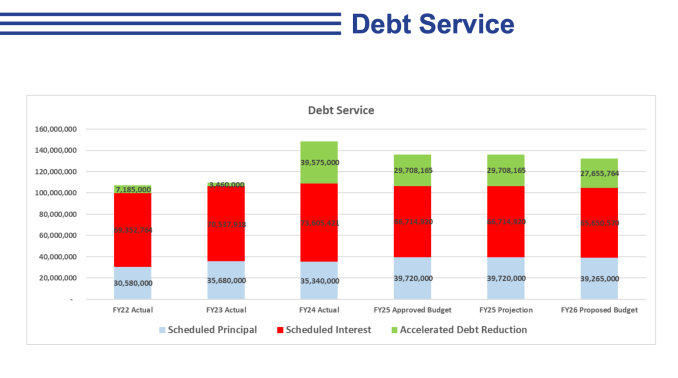
The City Commission’s
A decade-long strategy to decrease GRU’s liability by $315 million by the year 2033.
, which encompassed the rate hikes mentioned earlier, would have resulted in approximately $31.5 million yearly in debt reduction.
Bielarski said, “In Fiscal Year 22, Fiscal Year 23, we weren’t paying any of that green portion; that was going to the City in higher General Fund Transfer… Instead, that’s going to Wall Street bankers that have funded us, and we’re paying down debt, and we’re making ourself a healthy organization. And the rating agencies like that. They see it as a healthy trend. They want us to continue… Reducing debt equals declining interest expense equals improved financial health.”
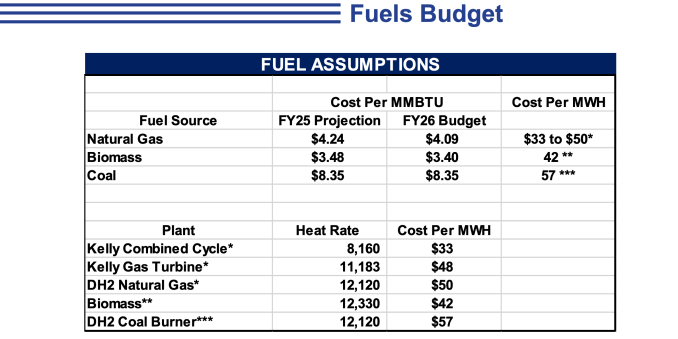
Bielarski stated that the most efficient facility is the Kelly Combined Cycle plant, which underwent renovations, followed by the Kelly Gas Turbine, and then the DH2 Natural Gas plant, with the biomass plant ranking last. He remarked, “As you can observe, the efficiency of the biomass plant falls short compared to the Kelly Combined Cycle plant… We’re glad to have the biomass plant; it serves as an excellent diversification option among coal and natural gas facilities.” He added that when the price of natural gas drops, GRU maximizes its use of this resource, but once prices rise above $4, “the biomass plants become operational.”
Decisions establishing rates and the budget
Next, the board approved resolutions establishing the utility fees and endorsing the budget as proposed, instructing staff to deliver the budget document to the City of Gainesville well before the July 1 deadline.
Carter announces resignation
In the Director Comments section, Director Craig Carter revealed that the upcoming meeting will mark his final one; his tenure ended in October, and although he had hoped the Governor would select a successor, this has not happened. Consequently, Carter opted to step down.
The post
GRU Authority states no price hikes for electricity and gas in the upcoming year, Carter informs of his resignation
appeared first on
Alachua Chronicle
.